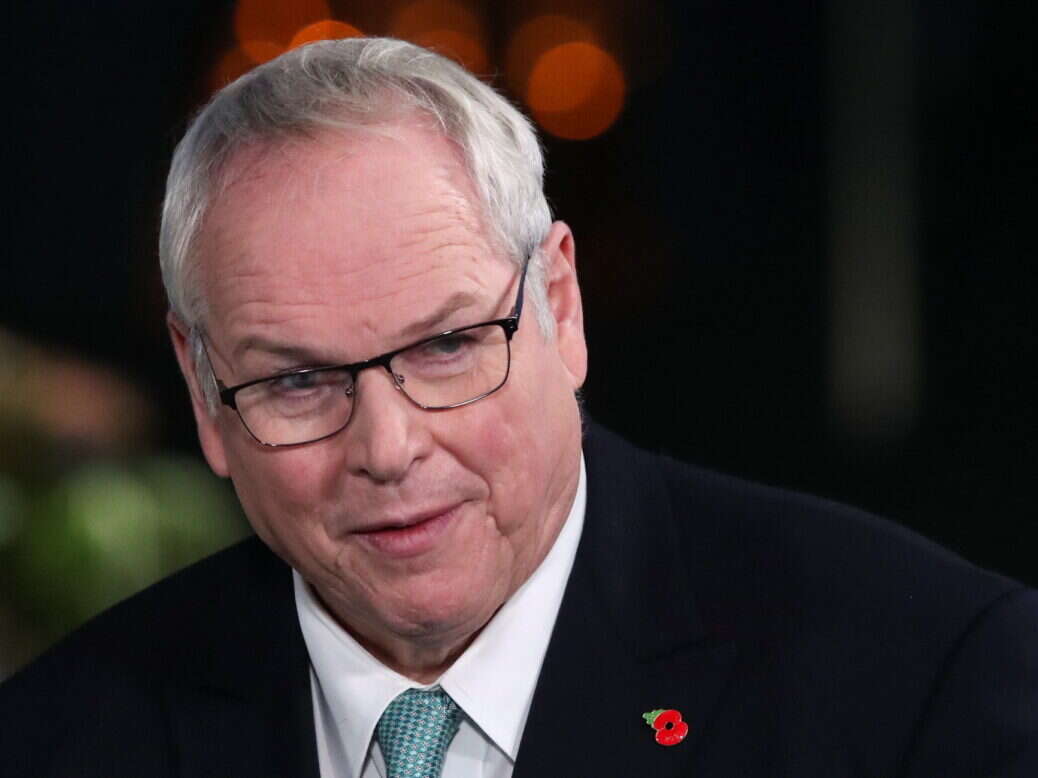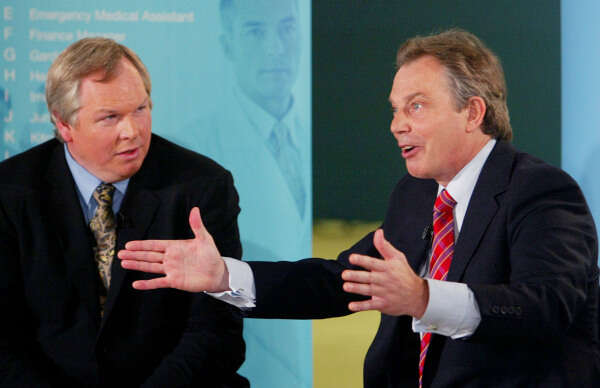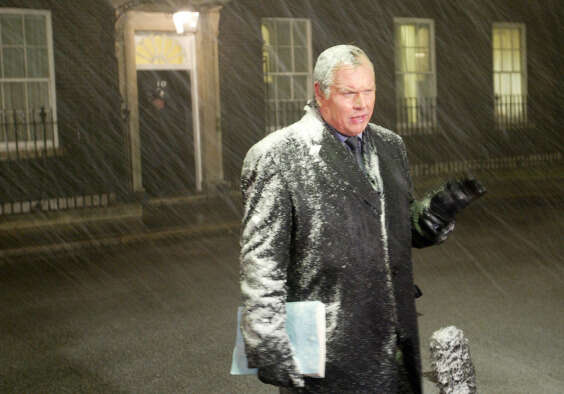
Over more than 30 years at Sky News, Adam Boulton established himself as one of Westminster’s best known and respected journalists.
He interviewed prime ministers and US presidents, hosted general election leaders’ debates, and won numerous awards for his work.
But, five minutes into my Zoom interview with him, he’s keen to set the record straight with me about his place in the British journalism industry.
“The questions you’ve asked me so far – about a kind of ‘establishment figure’, a ‘crusty establishment figure’ – I’m not. And I never have been.
“I’ve been in two startups. I was in TV-am, which was a startup. I was in Sky, which was a startup.
“In the case of Sky, we built Sky News. We built something that has moved obviously in terms of its importance towards the establishment. But that’s not – it’s never where I wanted to be.”
‘I’m basically decompressing’
Boulton left Sky News at the end of 2021, more than 32 years after he was hired as its founding political editor. He served in this role between 1989 and 2014, and was editor-at-large thereafter.
What’s he up to now? “I’m basically decompressing,” says Boulton, speaking to me from his pied-a-terre in Covent Garden.
At 63, Boulton isn’t ready to retire. But equally, “I don’t really want another full-time job”. He is writing for Iain Martin’s politics website, Reaction, and has plans to work on podcasts and documentaries later this year.
“I was thinking, was there any [full-time] job that someone could offer me that would tempt me? I think the only one that would be a bit of a laugh would be the BBC political editor,” says Boulton. “But I think the chances of that happening right now are not very high.”
Why? “Oh, because I think they’ve got their own people. And, as I’ve said in The Times and elsewhere, I think there is a – certainly, when it comes to reporting – I think there is a generational element in all this sort of stuff.”
Boulton left Sky News at around the same time as Jon Snow, 74, retired from Channel 4 News and Andrew Marr, 62, left the BBC to work for the New Statesman and LBC.
“I’m not saying there is a complete cull,” he says when I start asking him about the ends of eras and who might end up replacing Laura Kuenssberg as the BBC’s political editor. “But I think, by and large, people want their own people. And, by and large, they’re looking for a more diverse demographic for full-time reporting jobs.”
What do you put this down to? “A lot of it, I think, is correct. A lot of it is a process of rebalancing, and we do need more women and more people from diverse backgrounds. We need to reflect the society which we live in.”
Do you feel it’s been pushed too far? That someone with your background – white, male, privately educated, in his 60s – is now at a disadvantage?
“No. I’m not moaning at all. In my career, I was very lucky. I’ve had a very long career, and I actually started very young.”
‘I’d get mobbed by children asking for my autograph’

Adam Boulton (left) interviewing former prime minister Tony Blair (right). Picture: Reuters/Toby Melville
Boulton’s father was a leading anaesthetist and his mother was a geriatric nurse. He was brought up around London and attended the prestigious Westminster School before studying at Oxford and John Hopkins University in Washington, DC.
Boulton started his career in the US with news agency IPS before moving back to the UK, where he started off behind the scenes at a division of the BBC World Service.
From there, Boulton was able to land a reporting job at TV-am, a now-defunct breakfast television broadcaster. Within a few years, he was promoted to political editor.
It was in this job that he became one of the few journalists to have “doorstepped” the Queen. Boulton and his team stumbled into her during a live broadcast from Vancouver, and he immediately asked her for a comment on Fiji’s expulsion from the Commonwealth.
For unrelated reasons, Boulton’s TV-am gig established him as a minor celebrity among British children of the 1980s. “I’d be walking along and I would get mobbed by these children who’d all be asking for my autograph. They didn’t know who I was or what my name was. But the fact was, the politics spot on TV-am was very often after Popeye!”
Do you still get autograph requests? “Yeah, yeah,” says Boulton. “You sound surprised!” He adds, though, he notes that autographs have generally been replaced by selfies.
How many selfie requests do you get in an average week? “It depends whether you’re out and about. But in the past week, four or five? Something like that.”
Andrew Neil, the founding chairman of Sky TV, poached Boulton to be the first political editor of Sky News. He held this position until 2014 when he was replaced by Faisal Islam and moved on to become Sky News’s editor-at-large. From 2017 to 2021, he hosted All Out Politics on the channel.
Editorial influence from Murdoch? ‘Absolutely none’
The 1989 launch of Sky was funded by Rupert Murdoch. He retained a 39% stake in the business – and made attempts to purchase it outright – until 2018 when the company was acquired by US telecommunications giant Comcast.
As political editor of Sky News for 25 years, did Boulton ever feel pressure or editorial influence from Murdoch?
“Absolutely none,” he says. “This is what always surprises people. I’m an admirer of Rupert Murdoch because I think he’s enabled thousands of journalists to do their jobs. And launched many successful news organisations.
“And I think the thing about Rupert Murdoch is that – this sounds odd, but he is not someone who wants world domination and everyone to share his opinions. What he is – he’s a businessman who wants to grow his businesses. And his business is the business of news and communication.”
Have you ever met Murdoch?
“Yeah, I’ve met him a number of times. And he’s never commented to me about my work. But what he always wants to know is what I think’s going on. Not just at Westminster, but with the royal family… In fact, I once had a sportsman’s bet with him that [former German chancellor] Gerhard Schroder would be re-elected – which I won, I’m glad to say.”
How does Boulton think he and his team changed political journalism in the UK?
“When I went to Sky News, there was no on-site television operation working out of Westminster,” he says. “By and large, the correspondents had a desk in parliament where they couldn’t film. They would assemble the ingredients for a package and then would go back, either by taxi or by bus, to headquarters, cut a package.”
He says there was little live coverage from Westminster and that Sky News “pioneered” broadcasting from the House of Commons, Lords and select committees.
“We pushed back those barriers,” says Boulton. “And I think other broadcasters followed. Perhaps they did it better, but certainly that was something I think we started.”
Boulton’s devotion to the job, and his quest to disrupt and modernise political journalism, took a toll on his personal life.
“I missed the birth of my last daughter because I was at a meeting at Channel 4 about televising select committees,” he says.
I ask Boulton whether he feels now that he got too swept up in the job of 24-hour news and didn’t strike a good enough work-life balance.
“I mean, I divorced,” says Boulton, whose second wife is Anji Hunter, a corporate PR who previously worked for Tony Blair. “My first marriage broke up 20 years ago. And I think it was definitely because I was spending so much time in a world that my first wife wasn’t particularly interested in.”
‘I want to work for people who want me to work for them’

Boulton reports from Downing Street during heavy snowfall in 2004. Picture: Reuters/Toby Melville
Boulton appears to have departed Sky News on good terms. Colleagues paid tribute to him – including through highlight reels that documented his finest and funniest (“well, I don’t know why he was talking to a tree”) moments on TV – and he plans to continue contributing to the broadcaster.
But there does appear to have been some disagreement at the heart of his decision to leave.
In an interview with The Times last November, Boulton said the “direction which Sky News wants to go over the next few years is not one that’s a particularly good fit for me”. He specifically referenced an article John Ryley, head of Sky News, wrote for Press Gazette in which he suggested the “age of the all-powerful anchor is gone”.
The Guardian later quoted Boulton suggesting that Sky News is facing an “existential” crisis. Boulton wasn’t very happy about that Guardian article. He says he expected his comments to appear in a wider piece about broadcast news.
So, I ask, how did your departure from Sky News come about?
“My motto’s always been I want to work for people who want me to work for them. And I had a conversation a year ago with John Ryley about his plans for the channel. And I felt that… he wanted to go in a particular direction, and that didn’t particularly leave a lot of room for me.”
What direction was that?
“As you know, he wrote a famous article in Press Gazette about anchors and feeling that anchors had had their day.”
Boulton says that Sky News appears to have a growing interest in long-form documentaries and other content that consumers can access at any time “rather than necessarily being live broadcast”.
Boulton says he hopes to contribute to Sky in these areas as a freelance, but adds: “What I’ve always enjoyed doing is live television, rolling news. And it just seemed that, with that direction, it wasn’t such a good fit anymore for what I wanted to do. Although I very much still believe in what I do.”
‘I’ve never had a cross word with Kay or with Beth about that retweet’
In the early months of the Covid-19 pandemic, Sky News drew many plaudits for its coverage of the virus and the way it had been handled by the UK government.
Then, in December 2020, the news organisation became engulfed in scandal when it emerged that some employees had breached lockdown rules while celebrating the 60th birthday of star presenter Kay Burley.
While many at Sky News remained silent, Boulton spoke out. Sort of. He retweeted some criticism of Burley and colleagues, then acknowledged to The Guardian that the affair could raise concerns about “the credibility of our journalism”.
Following an internal review, Sky News took Burley off air for six months. Political editor Beth Rigby and North of England correspondent Inzamam Rashid were suspended for three months.
How does Boulton reflect on this episode now?
“Kay’s a friend and colleague. Probably my oldest colleague. We worked together for more than 40 years.
“What I did – I didn’t actually criticise her myself – what I did was I retweet things. I always say it’s not an endorsement. I retweet things that interest me or amuse people. And I retweeted someone saying they were morons. That’s all I did. One tweet.
“It didn’t even occur to me at the time that I was being disloyal or stepping out of line or whatever. I just felt that this had gone on and comments were being made and it was fair enough to retweet that. And I’ve never had a cross word with Kay or with Beth about that retweet.”
Boulton adds that, “when you end up being in a media story, it’s always a bit awkward when people are saying: ‘Don’t comment, blah, blah, blah.’ And you think, you know, whose side are we on?
“That said, Kay and Beth were punished. They took their punishment. They were suspended, publicly rebuked. They also both wrote public apologies about what they’d done, both to their colleagues and to the public.
“I think it was – well, I think it still is – a very serious thing. Covid was the absolutely dominant story, and to be seen publicly caught breaking the regulations was a pretty serious thing to do. And I don’t think Kay would disagree with that.
“But then look at how cleanly Sky dealt with it – they accepted that they were in the wrong – compared with the high drama that’s been entertaining the nation since before Christmas in Downing Street.”
I have one more question on this. Boulton and Burley have been friends for 40 years – so how come he wasn’t invited to the party?
“Oh, I said to her, ‘How are you celebrating?’ And she said to me, ‘It’s going to be a socially-distanced disco party.’ And I think she knows me well enough to know that a disco party’s probably not my thing!”
GB News? ‘I haven’t seen it’
So, what next for Boulton? It seems likely that his portfolio career might include regular work at another broadcaster.
It doesn’t sound like he’ll be moving to the BBC. (He didn’t apply for the political editor job, and later says he mentioned the position as a “bit of a joke”.)
What about GB News? What do you make of what you’ve seen there?
“Well, I haven’t seen. So I can’t really pass judgment,” he says. “I personally, as you’ll know from anything you’ve seen or heard about me, I am interested in impartial journalism. That’s what attracted me into television initially rather than print. I am not interested in imposing my opinions on other people. And, as far as I can tell from the discourse, there is certainly an element that they want to move in the direction of trying to do a British Fox News.”
What about TalkTV, Rupert Murdoch’s latest venture, that’s already recruited Piers Morgan. Maybe you’ll be linked to a position there?
“Yeah… yeah… Obviously, Piers has gone there. And it’s quite interesting, that stable, because they’ve also got Times Radio, and I’ve done a few things on Times Radio. Never say never. We are television-whatever-you-want-to-call-us – anchors, performers, whatever – we are talent. And, therefore, we get approached to do things. And you consider them and see if they’re a match.”
My time’s nearly up with Boulton. But I’m interested to know who he sees as the next generation of TV talent. Who will be the next big news anchors of British television?
“Well, I mean there’s the interesting philosophical question of whether that’s going to happen,” he responds, again pointing to Ryley’s Press Gazette piece.
“And, it’s not about their abilities, but is Emily Maitlis as important as Jeremy Paxman? Was Jeremy Paxman as important as John Tusa? And, you know, it kind of shifts.
“To a certain extent, current affairs has declined. There used to be a lot of – well, not a lot, but a fair number of – long, serious interview programmes. Weekend World would be a classic example, but quite often Panorama or programmes even that we were doing at Sky in the last century or so. But that is not something politicians are anxious to do anymore…
“So,” he adds, “I think the Robin Day figure, if you like, or even the David Frost figure – the grand invigilator – they may be roles which, to a certain extent, have had their day.”
Quickfire questions with Adam Boulton
Favourite non-news TV show? Only Connect – “I’ve never got an answer, which is why I find it interesting”
Favourite news programme? Channel 4 News – “Gary Gibbon I think is a fantastic political editor”
Favourite film? Barry Lyndon
Career low point? “Well, I have been fired. I was fired as a barman and I was fired taking out railway sleepers. So those were probably low points. I mean, there was someone at TV-am, which was great mayhem, who announced that he didn’t think I had a future on screen. And I was a bit upset by that… But he was a guy who had come from newspapers, so what did he know?”
High point? The 2010 leaders’ debates. (Sky campaigned for these televised debates ahead of the General Election and Boulton hosted one of the three broadcasts. The other two were shown on BBC and ITV.)
Favourite newspaper? Financial Times
Magazine? Private Eye
Musician or band? Rolling Stones
Favourite interview? Yehudi Menuhin, the violinist
Dream interviewee? Donald Trump and the Queen (again)
Top photo credit: Reuters/Yves Herman
Email pged@pressgazette.co.uk to point out mistakes, provide story tips or send in a letter for publication on our "Letters Page" blog
